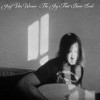Jozef van Wissem, "The Joy that Never Ends"
 Lutenist and contemporary composer Jozef van Wissem made his debut appearance on Important Records when James Blackshaw included his sublime piece, "The Mirror of Eternal Light," on his personally curated The Garden of Forking Paths. Fast-forward three years, and van Wissem has released his third full-length for Important: a steady refinement of his craft, clocking in at five songs, 37 minutes (plus a CD-only bonus track).
Lutenist and contemporary composer Jozef van Wissem made his debut appearance on Important Records when James Blackshaw included his sublime piece, "The Mirror of Eternal Light," on his personally curated The Garden of Forking Paths. Fast-forward three years, and van Wissem has released his third full-length for Important: a steady refinement of his craft, clocking in at five songs, 37 minutes (plus a CD-only bonus track).
"The Joy that Never Ends" kicks off the album with three minutes of carefully picked, interweaving lute notes and harmonics, echoing the title track from van Wissem's first Important LP, It Is All that Is Made, in its structure. Halfway through, Jeanne Madic provides a whispered vocal line in French, repeated until the track's end: "Tout ira bien," translated as "All shall be well." That general feeling, one of peace and well-being, runs throughout van Wissem's work as a whole, from his mastery of the Baroque lute (an instrument dating back to 17th century Renaissance days) to his Biblical track titles ("His Is the Ecstasy") and implicit themes of love, family and fatherhood. Van Wissem's music is plaintive, uncluttered and stark—and, more often than not, hypnotic in its disciplined use of structure, repetition, tone and space.
There is one notable departure on The Joy that Never Ends in contrast to his previous Important works. Four tracks in, "Concerning the Beautiful Human Form after Death" finds van Wissem collaborating with filmmaker Jim Jarmusch, himself an avid musician and music fan. (Check out the diverse line-up for his All Tomorrow's Parties festival as a recent example, or his collaborations with Iggy Pop, Tom Waits, GZA and other A-list musicians in Coffee and Cigarettes, a collection of short films.) While van Wissem plays a drawn-out series of minimal note clusters on his lute, Jarmusch provides a backdrop of radiating guitar feedback where, typically, there would be silence. It's a bold addition, with Jarmusch showing an impressive deal of subtlety and restraint, letting van Wissem's playing remain center stage.
Like his buddy Blackshaw, van Wissem is often at his best when he stretches his compositional abilities in a long-form setting, ten or fifteen minutes at a time. After four shorter pieces, "The Hearts of the Daughters Are Returned to Their Mothers" fits the bill perfectly, with van Wissem weaving layer upon layer of notes into a beautifully evolving, kaleidoscopic whole. At times, his playing sounds so complex and deeply layered, it's hard to believe van Wissem doesn't have at least twenty fingers—or that he hasn't overdubbed his playing a bit, as he's known to do. In any case, it makes for a gorgeous effect, bringing the piece to a peak three times in 16 minutes. As on the title track, Madic provides a few lines of French vocals as a coda. (Don't ask me to translate—I used Google the first time around.)
"The Great Joy" ends the CD version, van Wissem's playing stark and minimal once again. It is inessential—not a must-have if you'd rather enjoy the snap-crackle-pop of a vinyl pressing than a shiny silver disc—but I found it an effective digestif after the main course.
Samples:



